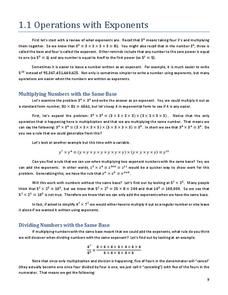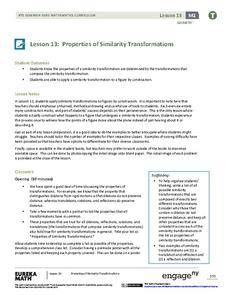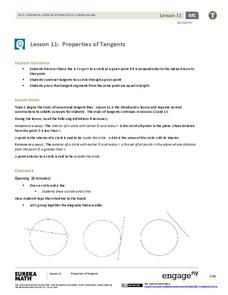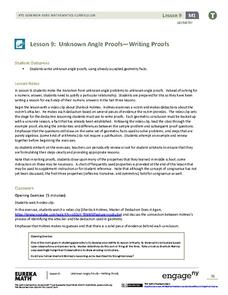Charleston School District
Review Unit 1: Exponents
What will be on the test? The resource provides comprehensive review items for the content of the unit on exponents. The resource divides the sections in the order you present the lessons during the unit.
CK-12 Foundation
Polygon Classification in the Coordinate Plane
Classify this resource into the "Use" pile. Scholars use an interactive coordinate plane to plot polygons given coordinates for the vertices. They use properties to classify each polygon and answer a few challenge questions regarding the...
Charleston School District
Operations with Exponents
It just multiplies out. The lesson provides the rules for operations with exponents and keeps them as positive integers in the lesson. Videos explain the rules for the operations with exponents while working out examples.
Balanced Assessment
Square in Square
Challenge the class to devise a method to determine the dimensions of a rectangle inscribed in another rectangle. Pupils make connections between functions and geometry as they examine the area and perimeter of a square or...
EngageNY
Solutions of a Linear Equation
Use the distributive property to solve equations. The sixth lesson in a 33-part series has scholars solve equations that need to be transformed into simpler equations first. Class members apply the distributive property to the equations...
Virginia Department of Education
Using Order of Operations and Exploring Properties
If you need some creative ways to teach the order of operations, use a series of activities that focus on properties. Each lesson uses different materials and works as a stand-alone activity, or can build upon the concepts of the last...
EngageNY
Definition and Properties of Volume
Lead a discussion on the similarities between the properties of area and the properties of volume. Using upper and lower approximations, pupils arrive at the formula for the volume of a general cylinder.
EngageNY
Properties of Similarity Transformations
You can explain it, but can you do it? After learners view a sequence of transformations, the next logical step is creating the transformation. Challenge your classes to construct a composition of transformations and verify the...
EngageNY
Properties of Tangents
You know about the tangent function, but what are tangent lines to a circle? Learners investigate properties of tangents through constructions. They determine that tangents are perpendicular to the radius at the point of tangency,...
Radford University
Properties of Different Quadrilaterals
Properly apply the properties of parallelograms. Pupils answer a set of questions designed to review the categories of quadrilaterals. They then identify the shape in each set of quadrilaterals that does not belong and explain why.
EngageNY
Rectangles Inscribed in Circles
Putting a rectangular object into a circular one—didn't the astronauts on Apollo 13 have to do something like this? Learners first construct the center of a circle using perpendiculars. They then discover how to inscribe a rectangle in a...
Benjamin Franklin High School
Saxon Math: Algebra 2 (Section 1)
This first of twelve algebra 2 resources provides a broad review of many algebra 1 concepts through a number of separable lessons and labs. Starting with the real number system and its subsystems, the sections quickly but thoroughly...
Curated OER
Dilations in the Plane
Tenth graders investigate dilations and explore the dilation transformation before investigating the properties of a dilation using Cabri Jr. High schoolers extend the concept of dilatation to the coordinate plane.
Ahisma Summer Institute
The Power of One - Math in a Different Angle
In this 2-day lesson focused on exponents, middle schoolers will cross the curriculum by engaging in science, history and language arts activities. Exponential growth will be explored using grains of rice on a chess board. Exponential...
Curated OER
Math Handbook: Trigonometry
You'll be spinning in unit circles once you read through this jumbo-sized resource of everything you need to know about trigonometry. Each page has color-coded examples with explicit directions that detail the problems and...
Curated OER
Trig Cheat Sheet
Your pre-calculus learners will make use of this wonderful cheat sheet that summarizes all things trigonometric. Definitions based on both the unit circle and the right triangle are included, as well as many convenient trigonometric...
Illustrative Mathematics
What is a Trapezoid? (Part 2)
This collaborative activity investigates the meaning of a trapezoid and a parallelogram. It begins by presenting two different definitions of a trapezoid. Learners are to reason abstractly the difference between the two definitions and...
Mathematics Assessment Project
Solving Linear Equations in One Variable
A thorough and professional appearance characterizes a activity on linear equations. Maturing mathematicians are taught to identify and exemplify linear equations with a single variable. They also classify equations according to the...
Curated OER
Arithmetic Commutative Property of Addition 1 Worksheet
Skills and drill practice may not thrill your class but as they say, practice makes perfect. They solve 16 single digit addition problems that require them to use the commutative property. Additional worksheet are available through this...
Curated OER
Arithmetic Identity Property of Addition
In this identity property of addition worksheet, students complete a total of 10 simple, 1-digit problems. Page has multiple links to additional resources.
Curated OER
Arithmetic Identity Property of Addition
In this identity property of addition instructional activity, students complete a set of 16 simple 1-digit problems. Page has multiple links to additional resources.
Curated OER
Associative Property of Addition Worksheet
Here is a set of 16 problems in which the associative property of addition must be employed to solve. Tip: Provide concrete objects or manipulatives to aid struggling learners in understanding the concept.
EngageNY
Unknown Angle Proofs—Writing Proofs
What do Sherlock Holmes and geometry have in common? Why, it is a matter of deductive reasoning as the class learns how to justify each step of a problem. Pupils then present a known fact to ensure that their decision is correct.
Beyond Benign
Packed Up Properties
Determine physical properties of potential packaging materials. Continuing from previous lessons in the series, the resource asks groups to identify physical properties of the substances. They test for conductivity, solubility, water...

























